
It doesn’t matter how long you have played; even pros can get anxious at times. In this article, I reveal the best ways to relax when playing guitar. Learn simple techniques to help you improve your skills and perform better than ever!
Everything you need to know is right here, so keep on reading!
You can use the table of contents below to take you to the area that interests you. Click on the little box to open it and then click on the section of the article you want to read, or you can read from start to finish if you want the full “how-to” experience!
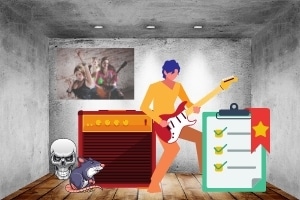
Checklist For Stress-Free Guitar
Choose The Right Guitar
Avoid guitars that are difficult to play.
Make A Playing Schedule
Keep your lessons organized for maximal efficiency.
Find Your Environment
Where you play can be as important as what you play.
Develop Good Playing Posture
Bad posture can make playing more difficult and cause fatigue.
Warm-Up Slowly
Develop a standard warm-up routine and start slowly.
Keep Your Muscles Loose
Avoid muscle tension while you play.
Control Your Breathing
Learn how to breathe properly while you play.
Consider Seeking Assistance To Control Your Anxiety
If your anxiety is severe, then consider seeking guidance from others.
Keep On Reading To Learn More About Each Topic
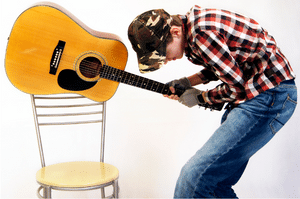
First, What Causes Anxiety When You Play Guitar?
We all know what anxiety is. Anxiety comes in all forms and has the potential to invade everything we do. Remember taking your driver’s test? Maybe you were dreading having to parallel park with the person holding your license in the palm of their hands looking over your shoulder.
Even things we enjoy doing can cause anxiety, like going to a big family reunion or taking a long-anticipated vacation.
But what causes anxiety when you play the guitar? The most common causes, especially among beginners, are fear of failure and worrying that others will not think you’re good enough. Anxiety can stifle your motivation to practice.
For more info, see How To Stay Motivated To Learn Guitar – Top Tips For Success.
Now check out these eight tips that will help you learn to relax and eliminate your performance anxiety as a guitar player!

Tip 1: Choose The Right Guitar
Your stress-free guitar journey begins with finding the guitar that works best for you. If you are a beginner, you need an easy guitar to play, or the instrument will quickly become a source of your anxiety.
A guitar that is difficult to play will discourage you from practicing routinely, especially if your fingers become sore. Electric guitars are usually easier to begin on than an acoustic steel-string guitar. The other option is a classical nylon string guitar. Nylon strings are easier on the fingers than steel.
Choose a guitar with strings that are close to the frets (a low “action”) and not too thick, or they will be difficult to press down. If you have small hands, you will be more comfortable playing a guitar with a thinner neck. You don’t have to spend a lot of money on a guitar to get something that is easy to play and sounds good.
Bring a family member or friend that plays guitar with you to the music store and play several instruments until you find one that feels right. Ask the store owner or manager to include a free guitar setup in the price of the guitar. The tech can install thinner (smaller gauge) strings, if necessary, and adjust the action and intonation.
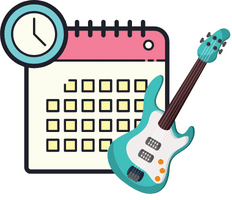
Tip 2: Make A Playing Schedule
Creating a playing schedule will make things a lot simpler by keeping you organized and on track with your lessons. It is the best way to make consistent progress in developing your skills to become a good player without getting too stressed out.
Schedule time to play when you won’t be interrupted or rushed. I like playing first thing in the morning when I wake up. Everyone in the house is still sleeping, and I am starting the day fresh, so I am at my very best. Find the time that works best for you and stick to it whenever possible.
Schedule yourself time to play each day but don’t overdo it, especially when you are first beginning. Start with 15 minutes a day and focus on the basics. Add additional practice time in 15-minute intervals and take breaks as needed.
It’s essential not to over-practice and stop immediately if you have pain or soreness in your fingers, hands, wrists, or arms.
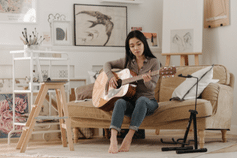
Tip 3: Find Your Environment
Where you play your guitar can make all the difference in how relaxed you’ll be and the enjoyment you’ll get out of doing it.
Find a spot in your home or yard that you like, which gives you the privacy you need to practice without interruption. You don’t need an entire room; just a little area with a comfortable chair or couch will do fine.
Surround yourself with the things you enjoy, like your favorite pictures, plants, scented candles, etc. Make it a place you will look forward to visiting for a practice session each day.
If you are a couch player, see The Best Couch Guitar – Relaxing, And Effortless To Play!
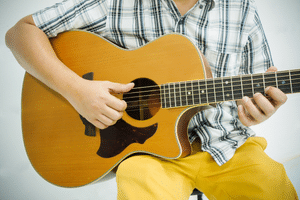
Tip 4: Develop Good Playing Posture
Part of learning to play with good technique and avoiding problems like tendonitis or carpal tunnel syndrome is developing good posture, especially in the beginning stages.
Bad playing posture makes it very difficult to relax and can lead to fragmented and unproductive practicing sessions.
If you play sitting down, then sit in a chair or on a comfortable but firm couch. Keep both feet on the ground and sit at a 90-degree angle. If you need to raise the height of your guitar, use a guitar footrest. This is especially important if you play for extended periods.
Get a comfortable guitar strap and adjust it to put the guitar at a comfortable playing height if you play standing. Stand up straight without slouching and wear comfortable shoes or sneakers. If you play a heavy guitar, like a Les Paul, take frequent breaks or stop if you develop back or shoulder pain.
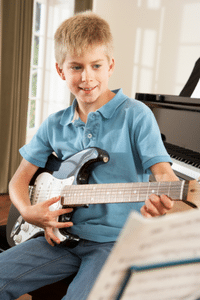
Tip 5: Warm-Up Slowly
It’s imperative to warm up each time you pick up the guitar. Think of guitar playing as exercising your hands. The right warm-up routine will stretch and relax the muscles in just the right way.
The better you become as a guitar player, the more important it is to do warm-up exercises before you play but plan on doing them right from the start.
Begin with a very simple set of warm-up exercises. Start slowly, then gradually build up speed, preferably using a metronome.
If you try to do too much too soon, your playing will not sound or feel relaxed, so pace yourself with your playing and always warm up before you get started.

Tip 6: Keep Your Muscles Loose
In addition to warming up, it’s essential to keep your muscles loose while you play. Concentrate on relaxing the muscles in the following areas.
Fingers, Hands, And Wrists
These are the muscles that do most of the work when you play. If you play with a pick, chances are your left (note-fretting) hand is doing most of the work. Fingerpickers can do more work with their right hand, depending on their musical style.
It’s important not to “clench” the guitar neck with your left thumb and hand. Don’t press the strings down with your fingers as hard as possible; just use enough pressure to make the note sound clear. Keep your left wrist loose as you move your fingers across the various strings.
When playing with a pick, all the motion should come from the right wrist when picking individual notes or playing chords, not the elbow. Picking speed and precision come from the wrist. Check out a video of Yngwie Malmsteen’s picking technique, and you will see what I mean.
If you are fingerpicking, use the muscles of your fingers in combination with your wrist. To play “sweeping” chords, you can use the right elbow’s motion to create a more dynamic and aggressive sound.
If you do traditional string bends, rotate your wrist, don’t use your finger muscles. If you do “Eric Clapton-Style” bends, then bend using the forearm muscles.
Forearms And Arms
It’s important to adjust your guitar so that your forearms and arms are in a position that feels natural and comfortable. Don’t strap on a guitar too low to make yourself look cool. It worked for Jimmy Page but you need to do what works best for you.
As your left-hand moves up and down the neck, your forearm and arm should always stay relaxed.
Shoulders
The left shoulder can move and rotate a small distance if you play up and down the entire length of the fingerboard.
Players that pick their strings aggressively tend to also use their right shoulder muscles during their right arm and forearm movement. Pete Townsend’s “windmill” picking is a great example.
(Note: If you are a “lefty, ” reverse the right and left-hand terminology.)

Tip 7: Control Your Breathing
The way you breathe is a key factor in helping you to relax when you play. The goal is to breathe slowly and naturally.
Players tend to hold their breath or make their breathing irregular when learning difficult or fast passages. Being anxious will only make your breathing worse, so take things slow and enjoy the challenge of learning new things.
It took me a while to break this bad habit. Many players are not aware they are doing it. An excellent way to monitor this is to make a video of yourself when you practice.

Tip 8: Consider Seeking Assistance To Control Your Anxiety
If you are a very anxious person by nature, consider seeking assistance from others to help you learn how to control it.
You can learn several stress-relaxation techniques to control anxiety, including meditation, yoga, mental imagery relaxation, and biofeedback. You can actually learn to use music for anxiety relief training.
Consider enlisting the help of family, friends, a counselor, or your physician. Some psychologists offer clinical sessions in music performance anxiety treatment.
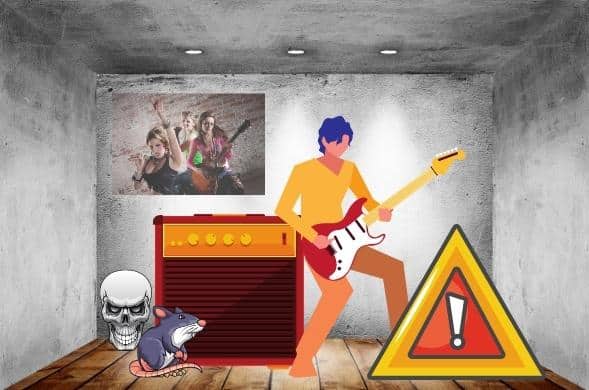
Beware Of Pre-Performance Anxiety!
The very thought of failure as you get ready to do something can make success more difficult to achieve! This is called pre-performance anxiety, and it is a common problem among students learning to play the guitar.
The best way to deal with this is to learn to recognize the signs and isolate what makes you anxious about playing. Perhaps you are trying to progress a little too quickly. You can learn something a little less challenging and return to the more difficult piece when you feel ready.
Always approach playing the guitar as an opportunity for fun and enjoyment. You should look forward to playing and making it a positive part of your life.

Advantages Of Relaxing While You Play Guitar
Here are some of the reasons to learn to relax while playing guitar.
- Learn faster
- Play longer
- Sound better
- Improve self-confidence
- More enjoyment

Disadvantages Of Being An Anxious Guitar Player
Anxious guitar players often face the following challenges.
- Slower learning
- Shorter playing sessions
- Increased mistakes
- Frequent discouragement
- Unpleasant training experiences

What Is “Visualization,” Why It’s Important, And How To Make It Work For You
Visualization is a technique used to help make a wish or a goal a reality. It is an essential tool because it can help keep you focused and motivated to complete a long-term objective.
Visualization can be used to achieve anything, including success playing the guitar. Here are two examples that illustrate the principle.
Example One
The thought of having to practice your guitar gives you pre-performance anxiety. You begin your practice session, and your muscles tense up, making it difficult to focus on your lesson. This is a common scenario that can be remedied with this simple process.
- Step 1: Visualize yourself thinking about practicing the guitar
- Step 2: See yourself feeling positive, relaxed, and anticipating an enjoyable and productive session
Example Two
Here is an example of putting the visualization technique into actual practice.
You would like to learn how to play a very difficult song. You have acquired all of the skills necessary to tackle it but don’t have the confidence to give it a try. Begin by visualizing the process in the following way.
- Step 1: Visualize yourself playing the entire song on your guitar flawlessly
- Step 2: Think about breaking the song into its component parts
- The rhythm parts
- Chords you are already familiar with
- New chords to be be leaned and mastered
- The guitar solos
- Note bends, hammer-ons, pull-offs, trills, and two-handed taps
- The rhythm parts
- Step 3: Think about beginning your practice session, visualizing yourself being relaxed, enjoying the training, and being successful
- Step 4: See yourself successfully learning each component, one at a time, and then moving on to the next part
- Step 5: Repeat the process until you have mastered each of the song’s component parts
- Step 6: Visualize yourself putting it all together and sounding amazing
Also, see Learning Guitar Solos And Easy Ways To Remember Them!
Some of the most successful people use visualization to take their skills to the next level! It takes targeted preparation, consistent effort, and confidence in your ability!

Frequently Asked Questions
Here are some of the questions I’m often asked about relaxing when playing the guitar.
Why Do I Tense Up When Playing Guitar?
It’s easy to tense up whenever you’re learning or doing something new. We are taught to anticipate the difficulty of doing something new before we even get started.
It’s essential to try to relax before beginning your practice session. Use the visualization technique in example one (above) to put yourself in a more relaxed state of mind.
How Can I Reduce My Tension While Playing?
Make playing the guitar a fun and fulfilling experience by tailoring it to your particular needs and skill level. Don’t expect too much too soon. Learn at a comfortable speed for you and realize that putting in consistent effort will eventually get you where you want to be with your playing.
Does Playing Guitar Relieve Stress?
Guitar playing can relieve stress by helping you focus on something that you enjoy doing. Strive to make your practice or performance sessions the best part of each day.

Final Thoughts
Learning to relax when playing guitar is one of the most helpful things you can do to improve your playing and enjoyment of the instrument!
Incorporate the eight tips I outlined above into your everyday playing, and you will begin to notice positive results almost immediately!
Learning to use the “visualization” technique will help you take your playing to levels you never thought possible!
Pre-performance anxiety can keep you from practicing routinely or make the thought of performing undesirable. Learn to recognize the signs and isolate what makes you anxious about playing.

If you are just starting to play the guitar or thinking about it, see 20 Guitar Tips For Beginners That You Must Know!
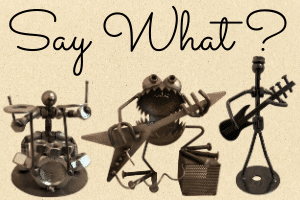
Tell Me What You Think
Please leave a comment below if you enjoyed this article, have any questions about how to relax when playing guitar, or want to give your point of view. I will be happy to help you.
- Do you consider yourself a relaxed player?
- Which of the eight tips would you find most useful for improving your playing?
- Is pre-performance anxiety a significant factor in your playing?
- Have you used “visualization” to help you achieve your musical goals? How has it helped you?
- Did you find this article valuable? How will it help you to improve your playing?



All three of my kids tried to learn guitar and only one successfully completed it. This article would have been perfect to give to all three. My daughter definitely had anxiety when it came to learning and could not relax. She would have benefitted from some of your tips. The second son just didn’t have patience.
I definitely think my oldest son follows your tips for being relaxed and secure in his playing, as well as when he was learning. Very helpful information for future and current guitarists.
Hi, Michelle
Thank You for your comments!
Learning to relax when you approach a challenging task is a skill that can be universally applied to all things with excellent results. The best way to learn to play the guitar or any other instrument is to approach it as something entertaining or fun. The more relaxed you are, the faster you will progress, as long as the effort and consistency are both there.
Maybe you should consider giving the guitar a go, assuming you don’t already play! 😊
Frank
I don’t know how to play a guitar yet, but I am learning. I get anxious when I play around other people, but I feel relaxed when I’m all by myself. Your tips are very nice and helpful, leaning something new is fun but its definitely not easy.
Thank you for sharing.
Hi, Champ
Thank You for your comments!
It’s natural to get anxious when you play around others, especially when first learning. You will become more confident as your playing continues to improve.
Eventually, you will have a song list that you can play very well, which you can pull from when people are listening. Save your training sessions for when you are alone. This will make things much easier.
Keep on playing & I hope you will revisit my website! 😊👍🎸
Frank